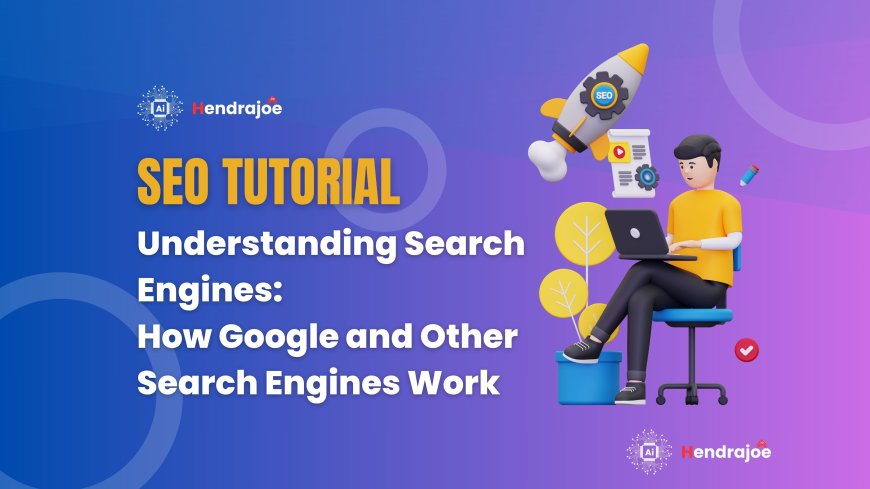Understanding Search Engines: How Google and Other Search Engines Work
Learn how Google and other search engines work in this comprehensive guide. Understand crawling, indexing, ranking, and the key factors that affect SEO and search results

Search engines are the gatekeepers of the internet. Every day, billions of people turn to search engines like Google, Bing, Yahoo, and others to find information, products, services, and solutions to their problems. However, most of us take search engines for granted, rarely stopping to wonder how they work behind the scenes.
Understanding how search engines work is essential for anyone interested in Search Engine Optimization (SEO). After all, SEO is about optimizing your website to appear higher in search engine results pages (SERPs). But how does a search engine decide which web pages should be shown to users, and why do some pages rank higher than others?
In this article, we’ll take a closer look at how search engines, particularly Google, operate. We’ll explain the main processes involved and help you understand what you can do to ensure your website is optimized to be discovered by search engines.
1. What Is a Search Engine?
A search engine is an online tool that helps users find information by typing in search queries (keywords or phrases). The search engine’s goal is to deliver the most relevant and useful results based on the searcher’s intent. Popular search engines include:
- Google: The most widely used search engine in the world, with over 90% of the market share.
- Bing: Microsoft’s search engine, often seen as the second most popular.
- Yahoo: Though it has lost some ground, Yahoo still remains a commonly used search engine.
- DuckDuckGo: Known for its privacy-focused approach, it does not track users’ searches.
While each search engine has its own unique algorithms, the basic processes are similar. Understanding these processes is key to improving your website’s search engine visibility.
2. How Do Search Engines Work?
Search engines work by following a multi-step process that includes crawling, indexing, and ranking web pages. Let’s dive into each of these steps.
Crawling
Crawling is the process by which search engines discover new and updated content on the internet. Search engines use automated bots called crawlers or spiders to scan websites and follow links between pages. The goal is to find fresh content and add it to the search engine’s index.
When a crawler visits a website, it reads the content of the page, looks for links to other pages, and scans for relevant keywords and other important factors. Crawlers start by visiting websites that have already been indexed and follow links to discover new pages. This is why having internal links on your website is so important—it helps crawlers find your new content faster.
Indexing
Once a crawler discovers a page, the next step is indexing. Indexing is the process of storing and organizing the information that the crawler finds. Once a webpage is indexed, it is added to the search engine’s database, allowing the engine to retrieve it when users perform a relevant search.
Search engines use algorithms to assess the content of a page and determine how it should be categorized. For example, Google’s algorithm may evaluate factors like keyword relevance, content quality, and the structure of the page. If your content is valuable and well-organized, it is more likely to be indexed favorably.
Ranking
After a page is indexed, the search engine uses complex algorithms to rank it. Ranking refers to the order in which search engine results appear when a user types in a search query. The goal of search engines is to rank the most relevant and useful pages at the top of the search results.
Google’s ranking algorithm, known as PageRank, evaluates a variety of factors to determine which pages are most relevant for a given query. While the exact algorithm is a closely guarded secret, Google has shared several important ranking factors over the years, including:
- Relevance: How closely the content matches the user’s search query.
- Backlinks: The number and quality of links pointing to a page. Backlinks are seen as a vote of confidence in the content.
- Content Quality: Google prioritizes high-quality content that provides value to users.
- User Experience: Factors like page load time, mobile-friendliness, and ease of navigation.
- Domain Authority: Older and more established websites tend to have higher authority and therefore may rank higher.
Serving Search Results
Once the search engine has ranked pages, it displays the results on the search engine results page (SERP). The results may include organic listings (unpaid), paid ads, featured snippets, knowledge graphs, and other special search features. Google, in particular, has increasingly added rich snippets like video carousels, local packs, and news sections to enhance the user experience.
At the top of the page, users might also see paid ads, which appear as part of Google Ads. These ads are ranked through an auction system where advertisers bid on certain keywords. Unlike organic results, paid ads are not influenced by SEO factors but by paid advertising strategies.
3. Key Ranking Factors Google Uses
Google’s ranking algorithm takes many factors into consideration to determine the most relevant results for any given query. Some of the most important ranking factors include:
Keywords
Keywords are the foundation of SEO. Google analyzes the content of your website to see if it includes the keywords users are searching for. Including relevant keywords in your page titles, headers, and throughout your content helps search engines understand what your page is about.
Content Quality
Google values high-quality content that provides value to users. This includes well-written, informative articles, blog posts, videos, and other forms of content. Your content should answer the searcher’s query in a comprehensive, user-friendly manner.
Google also considers the freshness of content. New or regularly updated content tends to rank better for certain queries, especially if it’s relevant and high-quality.
Backlinks
Backlinks (links from other websites to your content) are one of the most important ranking factors. The more backlinks you have from authoritative websites, the more likely your content will rank highly. Backlinks act as a vote of confidence for your content’s credibility and authority.
Mobile-Friendliness
With mobile usage growing, Google places significant importance on mobile-friendly websites. Websites that are responsive and optimized for mobile devices are more likely to rank higher in mobile search results.
User Experience (UX)
Google looks at how users interact with your website. Factors like page load speed, navigation, and the overall design of your site influence rankings. A site that offers a positive user experience, with fast loading times and easy navigation, is more likely to rank well.
Technical SEO
Technical SEO refers to the behind-the-scenes aspects of your website that affect its visibility in search engines. This includes factors like:
- XML sitemaps: Help search engines understand the structure of your site.
- Robots.txt: Tells search engines which pages to crawl and which to avoid.
- Structured data: Helps search engines understand the context of your content (e.g., product prices, reviews).
Page Speed
Page speed is an important ranking factor. Slow-loading pages can negatively impact user experience and cause users to leave before your page fully loads. Optimizing images, reducing unnecessary code, and using a content delivery network (CDN) can improve page speed.
4. Why SEO Matters for Search Engines
SEO is important because it helps search engines deliver the most relevant results to users. The better optimized your website is, the more likely it is that search engines will understand and rank your content appropriately.
Effective SEO ensures that your website is properly crawled, indexed, and ranked. It increases the likelihood of appearing on the first page of search results, where users are more likely to click. Higher rankings lead to more organic traffic, which can translate to more leads, conversions, and sales.
SEO also helps your website gain credibility. A website that consistently ranks well for relevant keywords is seen as an authoritative source by search engines. This trust can improve your brand reputation and drive long-term growth.
Conclusion
Understanding how search engines work is crucial for anyone looking to improve their online presence. From crawling and indexing to ranking and serving results, search engines use complex algorithms to determine which web pages appear in search results. By understanding these processes and optimizing your site accordingly, you can improve your chances of ranking higher and driving more organic traffic to your website.
SEO is a long-term strategy that involves creating high-quality content, earning backlinks, optimizing your site’s technical aspects, and ensuring a positive user experience. If you want your website to be found by your target audience, understanding how search engines work and optimizing your content is key.
What's Your Reaction?









































